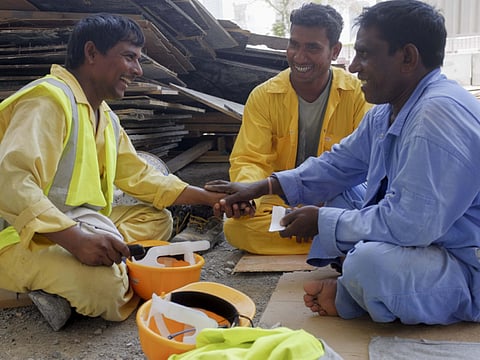India shuts down pension scheme for workers
Ambitious project launched in 2012 for blue collar workers received poor response

Abu Dhabi: The Government of India has decided to discontinue a pension scheme for Indian workers living abroad, which was first launched in the UAE in 2012 in its pilot phase before introducing in 16 other countries.
“The Government is in the process of closing the Mahatma Gandhi Pravasi Suraksha Yojana (MGPSY),” said a statement issued to Gulf News by Indian Ministry of External Affairs on Monday.
The voluntary scheme announced in 2012 offered three important benefits for skilled and unskilled workers: To save money for old age, to have financial means when they go back home and a life insurance cover during their stay abroad.
The Ministry of Indian Overseas Affairs in the previous Manmohan Singh Government introduced the scheme for workers in 17 countries, including the Gulf nations, where five million Indian workers holding Emigration Clearance Required (ECR) category passports are living.
India issues ECR passports to those who have not passed grade 10.
About 65 per cent of an estimated 2.8 million Indians in the UAE are blue-collar workers and most of them are in the ECR category.
Although the pension scheme is discontinued, the Government of India is strengthening other measures, including the insurance scheme, Pravasi Bhartiya Bima Yojana (PBBY), the spokesperson said.
He cited poor response from workers to the scheme as the reason behind closure.
“Being a voluntary scheme and for a variety of other reasons, the subscription under the MGPSY has been extremely low.”
However, an Indian Parliamentary committee had asked the Government repeatedly to publicise the scheme among Indian workers abroad, the head of the panel told Gulf News on Monday.
Few takers
“Despite this, the committee was informed by the government that there were few takers and in view of the scheme’s lack of popularity with the intended beneficiaries, it was felt there was little point in continuing with it. The Committee reluctantly noted the Government’s decision,” Dr Shashi Tharoor, head of Parliamentary Standing Committee on External Affairs, told Gulf News.
An Indian newspaper reported on Monday that the scheme attracted less than 300 subscribers in four years.
A social worker said both the previous and present governments did not make enough efforts to popularise the scheme.
“It was the best scheme introduced by the Indian Government for the workers because government also contributed money for each worker joining the scheme,” K. V Shamsuddin, Chairman of Pravasi Bandhu Welfare Trust, a welfare organisation for expatriates, told Gulf News on Monday.
He said the government had to make efforts to reach out to workers and educate them about the benefits of the scheme. “Unfortunately, it did not happen,” Shamsuddin said.
An executive of a financial firm, which was entrusted with enrolling workers, said certain moves were already there in 2015 to discontinue the scheme.
“One part of the scheme was withdrawn in 2015. Then it was not possible to market the scheme in that shape,” he said.
Mahatma Gandhi Pravasi Suraksha Yojana (MGPSY)
MGPSY was attractive with Government’s contribution in the scheme.
For a minimum annual contribution of Rs5,000 (around Dh275) from a worker, the government was supposed to contribute Rs3,900 and Rs2,900 for female and male workers respectively.
Indian Government offered to provide a contribution of up to Rs2,000 (Dh110) per year for male workers and Rs3,000 (Dh165) per year to women workers for up to either five years or until the worker returns home, whichever is earlier. The proposed contribution would flow to the individual account of each eligible subscriber.
The workers have to contribute between Rs1,000 (Dh55) and Rs12,000 per annum towards pension fund and Rs4,000 towards return and resettlement fund. They would derive corresponding benefits when they go back home and during their old age
Workers between the age of 18 and 50 who hold a Emigration Clearance Required (ECR) passports are eligible to enrol in the scheme.
Sign up for the Daily Briefing
Get the latest news and updates straight to your inbox



